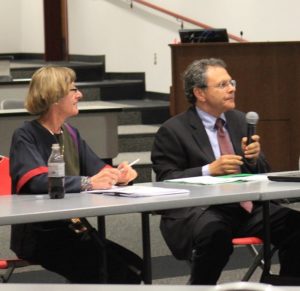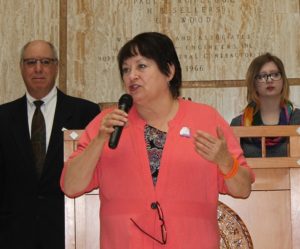UPDATED: So, who could be against a bill entitled the Patient Safe Staffing Act? House Republicans.
UPDATED: The Patient Safe Staffing Act advances further in the Legislature, on a vote of 6-5, along strict party lines. (Please see editor’s note below.)
When people are hospitalized they tend to be in a vulnerable state – both physically and emotionally. The expectation is they are in a safe environment.
But increasingly the public has learned hospitals can be dangerous places, especially when staff are overworked or forced to shorten the time they spend face to face with a patient.
So, who could be against a bill entitled the Patient Safe Staffing Act?
All five Republicans who sit on the House Labor and Economic Development Committee – Representatives Gail Armstrong (R-Magdalena), Rebecca Dow (R-Truth or Consequences), David M. Gallegos (R-Eunice), Rick Little (R-Chaparral), and Rod Montoya (R- Farmington).
But more on their opposition to safe patient care legislation later.
Sponsored by Representatives Christine Trujillo, Linda M. Trujillo, Elizabeth “Liz” Thomson, Harry Garcia, and Joanne J. Ferrary (Senator Linda Lopez has filed a companion measure, SB 281), the Patient Safe Staffing Act (HB 288) has now survived two committee assignments and is on the way to the first full house floor vote since a similar instrument was originally filed back in 2012.
Advocates for the bill, including expert witnesses and registered nurses Cleo Fowler and Diane Spencer, argued that hospitals in New Mexico, and elsewhere in the United States, routinely understaff their facilities.

This patient focused safe staffing bill is not new to most legislators. Nurse Spencer has testified numerous times before legislative committees, including an extensive presentation she made along with Jack Needleman, PhD, FAAN before the New Mexico Interim Legislative Health and Human Services Committee (LHHS) in August 2015.
Needleman is considered a US and international authority on staffing at hospitals, and is Professor and Director of Health Services PhD and MSHS Programs, School of Public Health, Department of Health Services, University of California, Los Angeles. (There is a link to his LHHS testimony below.)
For several years, the New Mexico Hospital Association (NMHA) and its phalanx of highly paid lobbyists have opposed similar patient safe staffing legislation. As hospital lobbyists offered their generalized arguments each year, rank and file nurses stepped forward with real life examples and exhaustive studies (i.e., Needleman’s and the New England Journal of Medicine’s) supporting the need for change as laid out in HB 288.
Stonewalling Transparency?
That did not deter newly elected Representative Rebecca Dow from seemingly using the NMHA lobbyists’ playbook to justify her opposing the improved transparency measures in the bill.
She questioned the reporting and publishing requirements in the bill, which would provide patients and their families an enhanced fact based assessment of a hospital’s commitment to and execution of good staffing policies.
Nurse Fowler, who unlike Dow and her skeptical Republican colleagues, has 38 years of direct care nursing experience in hospitals as a “staff nurse, as an educator, and as an administrator,” politely pointed to the poor performance of many New Mexico hospitals as reported by Hospital Compare, the Centers for Medicare and Medicaid Services on-line resource which objectively records and interprets the care given by hospitals throughout the United States:
“The reporting is a plan to give transparency and information to the citizens of New Mexico … one of the things that the Hospital Association said was that they’re doing better, and I would like to point out on Hospital Compare, which is put out by the Centers for Medicaid and Medicare, 35% of the hospitals in New Mexico received a grade of 1 or 2 out of 5; another 55% received a 3 out of 5; none received a 5 out of 5. So we do need to improve our hospitals, that is one of the reasons for this bill … and the literature is clear that improved staffing equates with improved outcomes.”
Dow, despite responding to Fowler that she “could not disagree with any of that,” persisted in her opposition to the transparency provisions, objecting to them being “a mandate versus an incentive.”
[In reporting on Representative Dow’s objections to the transparency and reporting requirements of HB 288, it is appropriate and fair to inform readers that Representative Dow, in her private role as an employer, has raised objections through her attorney in a civil action before a New Mexico court, to transparency in reporting about claims that one of two child care organizations she serves as CEO and president of, has been alleged in a civil suit to have stonewalled “the mother of one of the two child victims from seeking information about the employee who molested her child. That employee, Alejandro Hernandez, worked for the Sierra County chapter of the Boys and Girls Club. He is now serving a six-year prison sentence for harming both children. Dow is president and founder of Sierra County Boys and Girls Club as well as the president and CEO of AppleTree Educational Center in Truth or Consequences.” – as reported by NM Political Report, on October 10,2016. Click here for link to that story.]
The rookie legislator also suggested the proposed laws could force hospitals to layoff personnel.
This has been a common threat by hospitals not wishing to have staffing levels determined by anyone other than their management teams, which frequently declare that all is fine with patient to nurse ratios, despite proof from internal surveys and national studies concluding the opposite to be true.
Then Dow suggested the lower levels of nurses at hospitals are due to a shortage of available nurses, and graduating more nurses by providing incentives was the solution. She claimed the shortages, at least at her area’s hospitals “are not their choice … they don’t have the workforce to draw from…”

In response, the bill’s primary sponsor, veteran lawmaker Christine Trujillo (D-Albuquerque), carefully guided Dow through the travails of an inhospitable work environment and the resultant exodus of experienced nurses leaving due to poor staffing:
“This is the fifth year that I’ve brought this [bill] here. And we have tried to work with the hospital industry … and to compromise … the reality is, that just like in teaching, if you create an environment where people aren’t welcome, where they don’t feel safe, where they don’t feel appreciated, as they are overworked and underpaid, that adds to the reasons why there are so many vacancies.”
Other States Have Patient Safe Staffing Laws.
Fowler and Spencer also testified that several states have heeded the call to correct literal life-threatening management practices by requiring staffing improvements.
Over the past ten years treatment for lesser problems have been handled at outpatient or so-called urgent care facilities.
And because hospitals serve more patients with higher acuity levels on average than in the past, other states have concluded the best folks to determine staffing levels are the ones who provide direct care.
In other words, patients populating hospital beds today need more time from direct care nurses on average, than in the past.
According to the experts, hospital policies of understaffing would be corrected with HB 288.
Chairman Bill McCamley (D-Mesilla Park) also noted, “There are seven states around the country with this exact same regulation. That includes our neighbor to the east, Texas, which I would not call a state overly fond of regulation. So if the Texas legislature thinks that these types of regulations are good for patients, and that it’s a regulation worth pursuing, then it’s probably worth pursuing.”
Legislator’s Personal Experience with Understaffed Hospital.
Representative Linda Trujillo (D- Santa Fe) related her experience of not getting the attention needed while in a hospital in Albuquerque. While not medically trained, she diagnosed the neglect to be a result of understaffing.
“Back in 2011, I had a minor procedure done in Albuquerque because there’s a lack of services for women here in Santa Fe … but it went really bad. By the time I got back here (Santa Fe), I went to the emergency room, and they couldn’t really care for me because they didn’t know about the procedure … long story short, I ended up two weeks later, back in the hospital in Albuquerque; was there for three days, [and] finally checked myself out … because there was not enough care provided.
“There were not enough nurses on staff. My nurses kept coming in saying ‘I’m so sorry, we’re understaffed…’
“My husband recognized I was not in good shape, put me in our truck, literally in my pajamas, and drove me eight hours to Phoenix … the next day I was operated on. There was an abscess that had exploded in my body, and I could have died.”
“I really attribute [that failure] to a lack of ‘ones and twos’ that we have here in New Mexico. So I continue to drive to Phoenix to go to the Mayo clinic when I have serious things done.
“I don’t think that is okay. I have the resources to go to Phoenix … but I know that my neighbors, and family and friends don’t necessarily have that option.
“So I began to look around to see where I could help make health care better here. So, I started communicating with the nurses,” eventually becoming a cosponsor of HB 288.
Many others have had “really frightening experiences” that can be “attributed to low staffing.”
This bill is NOT ‘one size fits all.’
As this bill has picked up supporters along the way it is important to note that opponents have had their arguments knocked apart one by one. Including the one Republican committee members desperately clung to despite evidence that dispelled their concerns.
Their biggest point was about rural providers, hospitals, being able to comply with mandates.
However they seemed to ignore language in the bill which allows each hospital to establish its own levels, determined by that hospital’s professional direct care nurses. And the size of the committee can be determined by the hospital.
As with too many other issues this session, it seems Republicans in the House have been on a mission opposing key measures that helps working families – against a fair budget, against a fair revenue package, against early education opportunities for kids, against a meaningful minimum wage, and now against nurses having the proper amount of time with their patients.
 Arguments from the Republicans on the committee seemed to have been based on dogma versus data.
Arguments from the Republicans on the committee seemed to have been based on dogma versus data.
While stating that his own local hospital in San Juan “is always understaffed,” Representative Montoya, the Minority Whip, offered a long rambling defense of his decision to oppose the bill.
“But the issue is we are losing nurses. But nurses are not staying … placing mandates are not going to fix that.”
He ignored a key reason nurses are leaving – they are overworked, and more importantly, they do not have sufficient face time with their patients.
Montoya’s comments are quite informative of the failure to look beyond a political dogma and at data, so The Candle is providing this link (click here) to the official legislative archived video of the hearing on this bill; so readers can be their own judge of the Republican arguments (HB 288 is discussed beginning at about 4:07:34 of the video footage).
There are a number of detailed studies with links at the end of this story for anyone looking for more information as to the importance of safe patient staffing at hospitals.
Here are some key elements of the bill as described by the non-partisan Legislative Finance Committee Synopsis of Original Bill (for full fiscal impact report click here):
House Bill 288 would require that each New Mexico hospital set up a committee primarily for the purpose of determining staffing levels for each unit in the hospital. A majority of the members of the committee would be nurses providing direct patient cares (not nurses in administration).
Duties of the committee, aside from determining the staffing pattern, would include using national standards and local patient satisfaction data to determine outcome indicators for each hospital unit, and to update staffing levels for each unit at least every 12 months.
Staffing plans would specify the number of nurses needed on each unit for each shift, taking into account local factors and circumstances. Staffing levels would be determined based on nurse and other local recommendations, the characteristics of each unit, the characteristics of nurses on a unit (e.g., experience level). Hospitals would be prohibited from achieving desired staffing levels by mandating overtime. Nurses would be empowered to refuse assignments if the nurse “lacked the experience, training or experience to ensure patient safety,” if the assignment were outside the nurse’s scope of duty, or if taking the assignment would require the nurse to abandon a patient with whom she/he had established a nurse-patient relationship.
Hospitals would be required to report and post at the beginning of each shift a notice stating patient census, the staffing level of both nursing and ancillary staff in both actuality and in plan.
Quarterly, each hospital would be required to report to DOH the daily census and staffing numbers for each shift and each unit. DOH would specify the format of this reporting, and then would post the information on its website for public consumption. DOH would also be required to enforce hospitals’ compliance with the Act.
An appeals process for “aggrieved persons” (not defined in the bill but presumably including nurses and patients) should be set up by DOH, , and whistleblower protection is granted. In addition, “aggrieved or potentially aggrieved parties” are given permission to request a district court for an injunction to stop a threatened or actual violation of the Patient Safe Staffing Act.
An amendment to the bill makes the following changes:
In the bill’s long title, new language specifies that in only certain circumstances would a nurse be empowered to refuse an assignment.
“Patient abandonment” is defined as the nurse’s unilateral breaking of an established nurse-patient relationship without giving the patient notice according to hospital policy.
Nurses’ refusal of an assignment would not be considered “patient abandonment”.
Restates the responsibilities of DOH in reporting and action to be sure the hospital is in compliance with this act and department rules
Specifies that parties aggrieved by alleged violations of the Patient Safe Staffing Act could file suit in the district court of any county.
Links to studies/papers on staffing at hospitals:
New England Journal of Medicine Study on Hospital Staffing
(Editor’s note: The reporter filing this story has, in previous years, provided research to nurses and other advocates of HB 288; therefore any perceived bias is duly noted.)